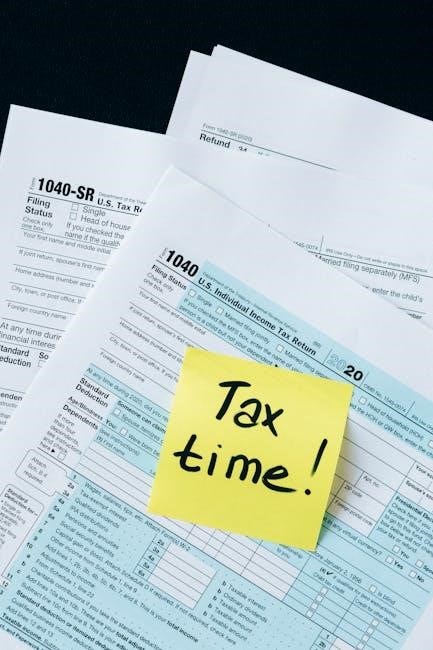The 475 Tax Deductions PDF is a comprehensive guide for home-based businesses and self-employed individuals, detailing eligible expenses, IRS guidelines, and simplifying tax deduction processes.
Overview of Tax Deductions for Home-Based Businesses
The 475 Tax Deductions PDF provides a detailed list of expenses home-based businesses can deduct, such as home office expenses, utilities, and equipment. It simplifies understanding IRS guidelines and highlights eligible deductions, ensuring businesses maximize their tax savings. The guide covers various expenses, from internet and telephone costs to depreciation of assets, offering a comprehensive resource for tax planning and compliance.
Importance of Understanding Tax Deductions
Understanding tax deductions is crucial for home-based businesses to maximize savings and ensure compliance with IRS guidelines. It helps identify eligible expenses, avoid errors, and optimize financial planning. Accurate knowledge of deductions enables businesses to reduce taxable income, lower tax liabilities, and maintain financial health. This expertise is essential for navigating complex tax laws and ensuring compliance, ultimately benefiting the business’s profitability and longevity.
Brief Explanation of the 475 Tax Deductions PDF
Brief Explanation of the 475 Tax Deductions PDF
The 475 Tax Deductions PDF is a detailed guide by Bernard B. Kamoroff, updated in 2018, outlining hundreds of tax write-offs for home-based businesses and self-employed individuals. It covers deductions for home office expenses, utilities, insurance, and depreciation, providing a clear, three-step system to identify eligible deductions, understand applicable laws, and apply them effectively, ensuring compliance and maximizing tax savings.
Eligibility Criteria for Home-Based Business Tax Deductions
To qualify for tax deductions, a home-based business must use a dedicated space regularly and exclusively for business, meeting IRS guidelines for eligibility.
Definition of a Home-Based Business Under IRS Guidelines
A home-based business is defined as a trade or business where the primary operations are conducted from the individual’s residence. The IRS requires that a dedicated space be used regularly and exclusively for business activities to qualify for tax deductions. This space must be clearly identifiable and separated from personal living areas, ensuring compliance with IRS regulations for business use of a home.
Types of Businesses Eligible for Tax Deductions
Eligible businesses include self-employed individuals, freelancers, and small business owners operating from home. The IRS allows deductions for businesses using a dedicated space regularly for work, such as consulting, freelance writing, or selling products. Sole proprietorships, single-member LLCs, and gig economy workers also qualify, provided they meet the home-based business criteria outlined in the 475 Tax Deductions guide.
Documentation Requirements for Tax Deductions
Accurate records are essential for claiming deductions. Maintain receipts, invoices, and bank statements for all business-related expenses. Use worksheets to calculate deductions, as outlined in IRS guidelines. Organize expenses by category, such as utilities, furniture, and internet costs. Retain documentation for at least three years in case of an audit. Proper record-keeping ensures compliance and supports deduction claims for home-based businesses.

Methods for Calculating Home Office Deductions
The IRS offers two primary methods to calculate home office deductions: the Simplified Method and the Actual Expenses Method. The Simplified Method uses a standard rate of $5 per square foot, while the Actual Expenses Method requires calculating actual expenses. Both methods require precise documentation to ensure compliance with IRS guidelines and maximize deduction benefits for home-based businesses.
Simplified Method for Calculating Home Office Expenses
The Simplified Method allows home-based businesses to deduct $5 per square foot of home office space, up to $1,500 annually. This IRS-approved method streamlines calculations, eliminating the need to track actual expenses. It’s ideal for simplicity and convenience, though it may yield smaller deductions compared to the Actual Expenses Method. Proper documentation of space usage is still required to comply with IRS guidelines.
Actual Expenses Method for Home Office Deductions
The Actual Expenses Method requires calculating and documenting actual home office expenses, such as utilities, insurance, repairs, and depreciation. This method often yields larger deductions than the Simplified Method but demands meticulous record-keeping. Expenses are divided into direct (e.g., paint for the office) and indirect (e.g., mortgage interest, utilities), allocated based on the percentage of business use. Form 8829 is used to calculate the deduction, which is then reported on Schedule C. Accurate records are essential to comply with IRS requirements.
Comparing the Simplified and Actual Expenses Methods
The Simplified Method offers ease by using a flat $5 per square foot (up to $1,500), while the Actual Expenses Method requires itemizing costs like utilities, insurance, and repairs. The Simplified Method is ideal for smaller spaces and minimal paperwork, whereas the Actual Expenses Method suits larger deductions for extensive home office use. Choose based on business size and record-keeping preferences for optimal tax benefits.
Common Deductible Expenses for Home-Based Businesses
Common deductible expenses include home office equipment, utilities, internet, telephone, and maintenance costs. These expenses help reduce taxable income, maximizing tax savings for home-based businesses.
Home Office Equipment and Furniture
Deductible expenses include home office equipment like computers, printers, and desks. Furniture such as chairs and shelves used exclusively for business can also be claimed. These items can be depreciated over time or expensed in the year purchased, providing tax savings for home-based businesses. Proper documentation is essential to support these deductions.
Utilities and Maintenance Costs
Utilities like electricity, gas, and water, as well as internet and maintenance costs, are deductible based on the percentage of home used for business. These expenses can significantly reduce taxable income. Accurate records and documentation are essential to support these deductions, ensuring compliance with IRS guidelines for home-based businesses.
Internet and Telephone Expenses
Internet and telephone expenses are deductible for business use. The IRS allows home-based businesses to deduct a portion of these costs based on business use percentage. Additional phone lines used exclusively for business qualify for full deduction. Proper documentation of usage is essential to support these deductions, ensuring compliance with IRS guidelines for accurate tax filings.

IRS Guidelines and Forms for Tax Deductions
The IRS provides specific forms and publications, such as Form 1040, Schedule C, and Publication 4591, to guide home-based businesses in accurately reporting deductions and ensuring compliance with tax regulations.
IRS Form 1040 and Schedule C
IRS Form 1040 is used to report personal and business income, while Schedule C is specifically for calculating profit or loss from a business. Home-based businesses must file Schedule C with Form 1040 to detail revenue, expenses, and deductions. This form is essential for accurately reporting business activity and ensuring compliance with tax regulations. It helps businesses claim deductions like home office expenses, utilities, and equipment, aligning with the guidance provided in the 475 Tax Deductions PDF.
Publication 4591 and Small Business Tax Responsibilities
Publication 4591 outlines federal tax responsibilities for small businesses, covering topics like income reporting, deductions, and record-keeping. It guides businesses on understanding their tax obligations, including employment taxes and quarterly payments. This resource, alongside the 475 Tax Deductions PDF, helps home-based businesses navigate tax complexities, ensuring compliance and maximizing eligible deductions effectively while aligning with IRS requirements for accurate tax filings.
Understanding IRS Publication 5369 for Gig Economy
IRS Publication 5369 provides guidance for gig economy workers, detailing tax responsibilities and deductions. It explains income reporting, business expense deductions, and record-keeping requirements. This resource is essential for freelancers and independent contractors, aligning with the 475 Tax Deductions PDF by offering clarity on tax obligations specific to the gig economy, ensuring compliance and maximizing eligible deductions.

Special Considerations for Home-Based Businesses
Special considerations include deducting real estate taxes, depreciation, and ensuring compliance with IRS guidelines for home-based businesses to maximize tax savings accurately.
Deducting Real Estate Taxes on Business Property
Real estate taxes on business property can be deducted on Schedule C, providing significant tax savings. These taxes include state, local, and property taxes related to the business use of your home. The 475 Tax Deductions PDF outlines eligible deductions, ensuring accurate compliance with IRS guidelines for home-based businesses and self-employed individuals to maximize their tax benefits effectively.
Homeowners Insurance and Association Fees
Homeowners insurance and association fees are partially deductible for home-based businesses, based on the percentage of business use. The 475 Tax Deductions PDF explains how to calculate these deductions, ensuring compliance with IRS guidelines. This guide helps maximize tax benefits by clarifying eligible expenses, making it easier for self-employed individuals to navigate complex tax rules effectively.
Depreciation of Home Office Assets
Depreciation of home office assets, such as furniture and equipment, is a deductible expense for home-based businesses. The 475 Tax Deductions PDF explains how to calculate depreciation using IRS guidelines, ensuring accurate reporting. This method allows businesses to spread the cost of assets over time, reducing taxable income. Proper documentation is essential to support these deductions and comply with tax regulations effectively.

Record-Keeping and Documentation Best Practices
Maintain accurate and organized records of business expenses and home office use to support tax deductions. Use digital tools or cloud storage for secure and easy access to documents, ensuring compliance with IRS requirements and streamlining the audit process.
Importance of Maintaining Accurate Records
Maintaining accurate records is crucial for tax deductions as it ensures compliance with IRS guidelines and supports claims in case of audits. Keep detailed documentation of business expenses, home office use, and related costs. Organize receipts, invoices, and bank statements, and store them securely, either physically or digitally. This helps in preparing tax returns efficiently and avoids potential penalties or disputes with tax authorities.
Using Worksheets for Deduction Calculations
Worksheets are essential tools for accurately calculating tax deductions, especially for home office expenses. The IRS provides worksheets in publications like Publication 4591 and Form 1040 Schedule C, helping to simplify the process. These worksheets guide you in calculating percentages of home use for business, ensuring compliance with tax laws. Using them helps avoid errors and streamlines the deduction process for home-based businesses and self-employed individuals.
Organizing Expenses for Tax Filing
Organizing expenses is crucial for accurate tax filing. Home-based businesses should categorize expenses like home office equipment, utilities, and internet costs. Using the 475 Tax Deductions PDF as a guide, ensure all receipts and invoices are stored securely. Separate personal and business expenses clearly, as only business-related costs are deductible. Proper organization helps in efficiently completing IRS forms and ensures compliance with tax regulations.
Common Mistakes to Avoid When Claiming Tax Deductions
Common mistakes include overstating business use of home, neglecting proper documentation, and missing tax filing deadlines. Ensure accurate calculations and maintain detailed records to avoid IRS issues.
Overstating Business Use of Home
A common mistake is overstating the business use of home, leading to inflated deductions. Ensure only the space used exclusively and regularly for business qualifies. Avoid claiming personal areas or exaggerating usage percentages. The IRS requires precise calculations, so maintain accurate records and avoid overestimating expenses. Use the simplified method or actual expense method wisely to prevent audits and penalties. Proper documentation is essential to validate claims.
Neglecting to Document Expenses
Failing to document expenses is a costly mistake, as it can lead to disallowed deductions during audits. Maintain detailed records of business-related costs, including receipts, invoices, and bank statements. Use worksheets to track expenses and ensure accuracy. Poor record-keeping can result in lost savings and penalties. Stay organized to validate claims and comply with IRS requirements, avoiding unnecessary complications during tax filings. Proper documentation is essential for securing eligible deductions.
Missing Deadlines for Tax Filings
Missing tax filing deadlines can result in penalties, interest, and loss of eligible deductions. Ensure timely submission of IRS forms, including Schedule C and related documents. Use calendars or reminders to track key dates. Late filings may delay refunds or complicate audits. Stay informed about deadlines through IRS publications or tax professional guidance to avoid unnecessary financial setbacks and maintain compliance with tax obligations. Proper planning prevents costly delays.
Resources for Further Information
Access the 475 Tax Deductions PDF for detailed guidance. Utilize IRS resources like Form 8829 and their help section. Consulting tax professionals can provide personalized advice and ensure compliance with regulations.
Accessing the 475 Tax Deductions PDF
The 475 Tax Deductions PDF is available on the IRS website and other tax resource platforms. It provides a detailed guide to tax deductions for home-based businesses, including eligible expenses and simplified methods for calculating deductions. The PDF is regularly updated to reflect changes in tax laws, ensuring users have the most current information. It is an essential resource for maximizing tax savings and understanding complex tax regulations.
IRS Publications and Forms
IRS publications like Publication 4591 and Publication 5369 provide detailed guidance on tax deductions for home-based businesses. Forms such as Form 1040 and Schedule C are essential for reporting business income and expenses. These resources help ensure compliance with IRS regulations and maximize tax savings for self-employed individuals and small business owners.
Consulting Tax Professionals
Navigating the complexity of 475 tax deductions can be challenging. Consulting tax professionals ensures accurate compliance with IRS guidelines and maximizes eligible deductions. Their expertise helps interpret complex rules, avoid errors, and optimize tax savings. Professionals provide personalized advice tailored to specific business needs, ensuring adherence to updated tax laws and maximizing benefits for home-based businesses and self-employed individuals.
